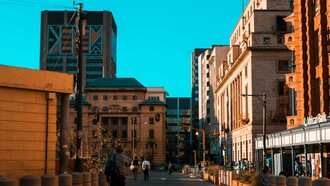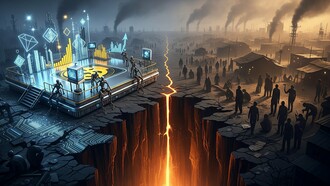Today, in this second decade of the 21st century, we are living in very intense times. The wars in Ukraine and Palestine, pandemics, climate change, growing economic inequality, political hyperpolarization, a seeming collapse of the existing “world order,” and so on. Although, to be realistic, when one analyzes history, from the point of view of the inhabitants who lived at each of its moments, all times have been intense. So, what would make the present situation so particularly critical?
- That we are crammed with people and interconnected like never before.
- That we are exerting unprecedented pressure on our life support systems.
- That we cannot escape by sea to other continents and called them a new world.
One does observe, that just when maximum collaboration by the people of the planet is necessary, and we have the technological means to connect as never before, political polarization is at its apex, multilateralism and internationalism are in crisis, and connectivity is being used to promote tribalism, consumption, conspiracies, and cultural wars rather than to promote a unified humanity. The so-called concert of nations, which was barely awakened, is fragmenting into a widespread isolationist nationalism, underlined by a philosophy of “each one to its own."
I feel, however, that human change is like love: we always think it is impossible, but it is inevitable. So, in parallel with the growing isolationism and nationalism and the retrenchment into selfish pursuits, there is also a widespread emergence of voices and actions for social justice, equity, democracy, and the protection of the planet.
My mind goes back 20 years, to August 14, 2002. To the opening of the conference "Peace in Peacetime," held in San Juan, Puerto Rico. Convened by the Puerto Rican Senate and the Arias Foundation, at the wake of the turn of the millennium, it brought together leading individuals from all walks of life and from all over the world: actors, singers, scientists, politicians, military, writers, journalists, mystics, corporate leaders, and Nobel Peace Laureates, to address the theme of how to live in peace in times of relative global peace and envision a new humanity in the millennium to come. In other words, to rethink the future of the world.
I wanted to come here, at the age of 91, because like all of you, I live in anguish over the fate of the world.
This was the opening line of the conference's inaugural speech, given by Ernesto Sabato, the renowned Argentinean writer. It was the first and only time I met him. He traveled from Buenos Aires. As I was part of the organizing committee of the conference, I was assigned to take care of him during his brief stay. I remember going to his room, accompanying him down to the conference hall, and taking him to the podium. There were about 800 people present. Sabato was very frail, and he was leaning on my arm as we entered the room. People stood up and gave him a welcome ovation.
"What's wrong?" He whispered to me, a bit startled, and I saw his years, and his depth. "They are recognizing you, Don Ernesto," I replied. "They know who you are, and they appreciate you." He looked at me silently and lowered his eyes as we continued to the stage. His opening speech, given in a slow and emotive voice, invited everyone to a deep reflection of concern at the critical moment that the world was living at that time, while maintaining an underlying hope that things were going to be better.
Amid the fear and depression that prevail, there are emerging imperceptible glimpses of another way of living, a living that seeks the recovery of a humanity that now is feeling itself faint. Despite the turbulent times we are crossing, there is hope that man, at the edge of a great leap, may embody the transcendental values, the values of the spirit, and the desire to turn life into a human terroir.
He finished saying:
When we take responsibility for the pain of the other, our commitment will give us a meaning that will place us above the fatality of history.
A very moved audience gave Don Ernesto a standing ovation for about ten minutes. He looked exhausted and touched. I helped him get down from the stage, and he asked me to allow him to sit on one of the chairs immediately below. While sitting there, he was approached by one of the young women ushers, students at local public high schools, who had been selected as volunteers to help on that occasion.
She carried in her hand a much-used copy of the book The Tunnel, one of Sabato’s masterpieces, and said to him, "Don Ernesto, can you sign me your book?” He agreed with great affection, and the girl, upon reading his dedication, said, "Don Ernesto, can I give you a hug? "Of course, my little girl," he told her very fondly. She hugged him tenderly and said (and I will never forget this): "Don Ernesto, don't worry, we are going to save the world." And our six eyes were filled with tears.
Back now, from that moment of beautiful memory to the present crises of the world, in this second decade of the third millennium. Some time ago, I read an article by Vimala Takar, a woman activist and spiritual teacher from India, who stressed, like Don Ernesto, the urgent need to deepen human consciousness. The need to go beyond political and organizational processes to achieve a true revolution that would lead to a new humanity.
She said that we could no longer escape the fact that science and technology had confirmed that we are all interconnected in a holistic way. The divisions between peoples and nations, are the product of ignorance of this continuity, and that fragmentation is the root cause of conflicts. A deconstruction of this fragmented perception is necessary if we are to achieve a true social transformation. She said, “Our lives would be truly graceful the day that the misery of the other feels like the misery of all. The force of love is the force of total revolution, it is a force not yet totally liberated, unknown, and unexplored that constitutes the dynamic for true change. Compassion does not follow from intellectual conviction or from an emotional reaction, it is simply there when the unity of life is a fact that is lived.”
During the last century, Meher Baba, a spiritual master from India, said during the difficult times of the Second World War:
To perceive the spiritual value of oneness is to promote true unity and cooperation. The new life must be based on this spirituality, it is not something that belongs to a utopia but is completely pragmatic.
The evolution of human consciousness and sensitivity ranges from an instinctive and crass egoism for survival to the sacrifice for others that we see, in the most sublime moments of love. The overwhelming pressure on the planet's resources, the increased population, and the increased consumption greed of this population are taking us to new crossroads. Either we fully incorporate into our ethics the knowledge that all life is a unified and continuous field and develop a new humanity based on the unifying force of love and collaboration to support the continuum of life because we are all in the same boat, or we sink with the “each one to his own” fragmented approach.
This is the crux of our present dilemma. It probably has always been, but today we are too many of us, and we are seriously undermining the planetary life support systems.
I drifted back again to the meeting with Ernesto Sabato. He asked me if I could take him to a shopping center because he wanted to give a gift to a sick niece. And we went to a shopping mall. While someone was buying the gift, I sat down to talk with him. I remember I told him that my sister had read his book Al Final (Towards the End), a sort of autobiography that he published in 1988, and that she had told me that in the second chapter, he was describing a vision of what happened to the twin towers in New York in 2001. These were the exact lines in the book that she referred to, which I reminded Don Ernesto of:
Today I tried to rest at least until five o'clock, but a kind of vision came to my mind ... something dislocated ..., and so I spent a long time debating whether it was reality or delirium. Something murky, related to the reality we are living, from the unconscious, like a murmur, reminded me of what I have been painting in recent years: ... towers that collapse, birds burning in the skies. I don't know what they mean, but I felt they were maybe warnings.
His eyes filled with tears, as I recapped these lines, and he said "now I remember, yes, now I realize what I saw. Matilde [his then deceased wife] told me, they were things of the future."
Later, I thought, it seems that Don Ernesto had the capacity for premonition, which perhaps allows him not only to see warnings but also hopes, and that is why his trembling voice that morning 20 years ago as he gave his opening remarks resounds today in my mind and projects hope.
Many men and women who, anonymously, sustain the human condition amid the greatest precariousness we are living today are now united in their service to others, in their absolute desire for a more human world, they have begun to generate change, devoting, and risking their lives, by surrendering to deep feelings for others, in love and solidarity. And the Earth is becoming pregnant with their commitment.
Yes, today we are at what seems to be a critical juncture for humanity. Vanity, greed, selfishness, tribalism, polarization, and inequity seem to be flourishing, while at the same time human connectivity, intermingling, scientific knowledge, technology, and information on our history and evolution have reached heights never attained before in the history of humanity. This dual growth, plus a vast population and the globalization of human contact, is bringing us and life on our planet to a turning point in our evolution.
The large mass of humanity is caught up in vain and greedy pursuits. The present spectacle of humanity, the growth of populist nationalist movements taking hold in so many countries, the fracture of the international system like the United Nations to address global crises like pandemics or climate change, the economic inequalities, the rise of racism amid increased migrations, etc., is bound to make us very pessimistic about the future of our humanity.
Meher Baba said:
The real possibilities of a New Humanity are hidden to those who look only at the surface of the world-situation, but they exist and only need the spark of spiritual understanding to come into full play and effect.”
Maybe, as imaginal cells do in the tissues of the caterpillar, the many men and women, that do not show up in the headline news and who are impregnating the world with love and solidarity, are the driving unifying forces that are being silently released, to help us metamorphose into a new humanity.
After all, in the grand scheme of the evolution of the universe, how many moments of apparent conflagration, collapse, and extinction have instead become opportunities for growth and for the evolution of form and consciousness. In the relatively short history of humanity, and despite all our confusion, our conflicting egos, and clashes, we have seen some collective progress in our civilization, while at the same time exquisite flowers have bloomed and continue to do so, like Francis of Assisi, Hafiz, Rumi, Lao Tzu, and so many other mystics, poets, musicians, scientists, and also extraordinary unknown people, that contribute with their lives of service, of love, of talent, to create beauty, to spread compassion, and to reflect joy. They make this life, originating in stardust and spirit (following whatever myths and celestial mechanics you want to believe), into a better future for all. They contribute to the appreciation of the beauty of life and the oneness of being.
Maybe, the spreading of this vision of oneness, in a new emerging dispensation of spirituality, will again save us from ourselves. In these times, the only way out of the threats that loom over us is through collaboration, compassion, and a unitary perception of life. A perception that is born out of empathy and love for the other, not out of duty, but out of a clear perception that we are all in the same boat.
Or as Desmond Tutu once said:
One of these days we are going to realize that we are all family.
Then, as Sabato concluded in 2002:
The planet will be our terroir.















